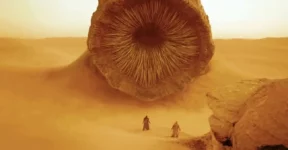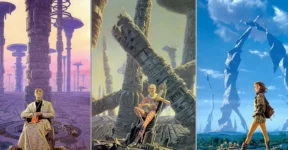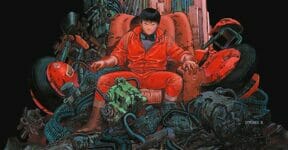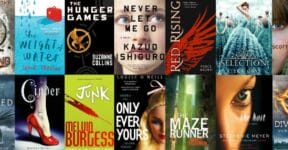Remember the following list contains only a tiny fraction of great literary works categorized under the sci-fi fantasy genre and should never be considered the only recommendation you will ever need. At the very least, it should give you an idea of how diverse science fiction and fantasy books can be and the genre’s practically boundless reach.
Alice’s Adventures in Wonderland by Lewis Carroll (1865)

Buy Alice’s Adventures in Wonderland
One of the genre’s most celebrated works, Alice’s Adventures in Wonderland has been retold countless times across generations and never failed to keep its fantastical charms. When the novel was first published in 1865, it played a major factor in transforming the typical stiff, didactic, and often preachy Victorian approach into sillier and more nonsensical literature. The tale of a curious girl on a journey through a terrifying yet tantalizing world never ceases to amaze readers, adults and children alike.
Through the Looking-Glass, and What Alice Found There by Lewis Carroll (1871)

Buy Through the Looking Glass here!
It is a direct sequel to Alice’s Adventures in Wonderland. Once again, Alice finds herself in a fantastical world as she climbs through a magical mirror. The natural order of things in the strange new land is that everything runs in reverse; you walk in the opposite direction to reach the destination, run to stop, and get imprisoned before committing a crime. Even people’s memory works forward as well.
American Gods by Neil Gaiman (2001)

Odin, or Mr. Wednesday as the novel refers to the Norse god, is on a road trip across the United States to rally other divine figures in a campaign to prevent Americans from worshipping new gods of the stock market and technology. Mr. Wednesday is accompanied by a convict named Shadow as he makes his case to convince the manifestations of Loki, Anubis, and Anansi to join him in an upcoming battle for American’s soul.
Harry Potter and the Half-Blood Prince by J. K. Rowling (2005)

Buy Harry Potter and the Half-Blood Prince here!
Now in his sixth year at the Hogwarts School of Witchcraft and Wizardry, Harry Potter is coming closer to an inevitable showdown against Lord Voldemort. Half-Blood Prince is the penultimate installment in a seven-book series, and accordingly setting the stage for the long-awaited conclusion. It is filled with fantastical time travel as Harry Potter and Professor Dumbledore try to unveil the secret of the dark lord’s power.
The Fifth Season by N. K. Jemisin (2015)
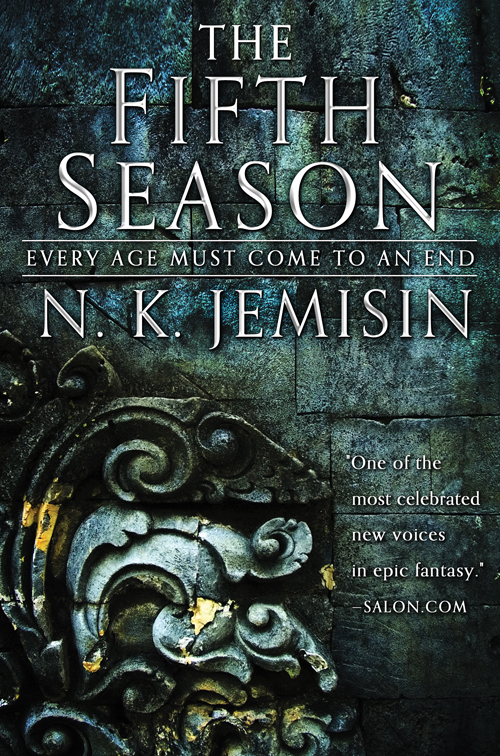
With his debut 2010 fantasy novel “The Hundred Thousand Kingdoms,” N. K. Jemisin carved his path through literary popularity. But it was “The Fifth Season” that actually brought him into sci-fi fantasy stardom. Events in the novel are set in a place called Stillness, where catastrophic disasters are nothing peculiar. Only rare masters known as Orogenes can control (and trigger) the frequent deadly quakes, and so their lives are in constant grave danger from violence.
The Hitchhiker’s Guide to the Galaxy by Douglas Adams (1979)

Buy The Hitchhiker’s Guide to the Galaxy here!
If there is one particular sci-fi fantasy book that can generate profound influence over the entire genre, it would be none other than “The Hitchhiker’s Guide to the Galaxy.” It is a story of Arthur Dent, an everyman who travels across the galactic freeway after his home planet has been destroyed. His misadventures are full of comedic absurdity, highlighting the blatant insignificance of Earth on the larger scheme of things.
Snow Crash by Neal Stephenson (1992)

Metaverse might be something relatively new in today’s blend between virtual and social worlds, but it has always been there in literature since Neal Stephenson’s 1992 novel “Snow Crash.” The main character, named Hiro Protagonist, lives in both worlds as two distinct characters; he is a warrior and hacker in the virtual Metaverse and a pizza delivery person in reality. It is a bewildering techno-thriller with plenty of sexy moments and action sequences.
A Canticle for Leibowitz by Walter M. Miller Jr. (1959)

Buy A Canticle for Leibowitz here!
A new Dark Age resurfaces following World War III. Most people no longer believe in science and see it merely as an evil instrument that brings about destruction. Angry mobs trigger violent attacks on anybody who can read and burn any book they can find. St. Leibowitz understands the importance of written records and science better than anyone. He is risking everything to preserve as much as knowledge as he can after the fall of civilization.
Dhalgren by Samuel R. Delany (1975)

No work of sci-fi fantasy has polarized critics in the way that Dhalgren does it. According to Wiliam Gibson (Neuromancer, 1984), it is a riddle with no answer written by one of the world’s greatest science fiction stylists; in contrast, Philip K. Dick’s crushing criticism suggests that the novel is an utter trash. The story opens with a man entering a city called Bellona where strange things abound. There are no electronic signals, probably because time moves in a loop and the sky has two moons at night. Narration is written in a circular structure with more than enough entry points to put your patience to the test. It is psychedelic, dense, and loaded with such challenging subject matters as sex, violence, gender, and race. Dhalgren is not for the faint of heart.
A Clockwork Orange by Anthony Burgess (1962)

The good thing about a book being a staple of high school curriculum is that every student gets to read it and understands the message. On the downside, it becomes somewhat easy to overlook how brilliance the book really is. “A Clockwork Orange” is a post-modern dystopia where a brutal teenage delinquent is subjected to psychological reconditioning by draconian police. It is transgressive, violence, told in skilled patois, and an obvious all-around literary triumph.
The Time Machine by H.G. Wells (1895)

A small step for H. G. Wells, but a giant leap for science fiction. “The Time Machine” is among the first novels to have popularized the concept of time travel, ignited a spark of inspiration and become the literary work everyone still tries to imitate. It is a journey to hundreds of thousands of years into the future where our Traveler discovers that humans have evolved into two major races: the Morlocks and the Eloi. Much of the book talks about the future of humanity amidst large-scale industrialization.
The Complete Robot by Isaac Asimov (1982)

The “Foundation” series can easily enter any list of influential science fiction books of all time, so it might be a good idea to include another of Asimov’s works titled “The Complete Robot” published in 1982. Many of the stories in the book are also found in other publications, including the highly praised “I, Robot” with which Asimov gives us (and science fiction) the quintessential Three Laws of Robotics. The author’s vision of robots has laid the groundwork for many robot-focused films and novel over the decades.
Solaris by Stanislaw Lem (1961)

Unlike most sci-fi fantasy books that talk about aliens, Solaris doesn’t actually depict the extraterrestrial species as a little green creature with big black eyes. The unknown intelligent life in the novel comes in the shape of a sentient ocean to be supposedly studied by scientist Kris Kelvin. Unbeknownst to the researcher, the ocean has been doing exactly the same thing; it learns about human. The ocean can reflect his most traumatic experiences and memories, practically putting him into a state of utter disadvantage in the face of superior intelligence.
We think there is not and will probably never be a definitive list of the best sci-fi fantasy books of all time any person could make. Every reader has personal preferences and biases; some people like hard science fiction books with lengthy expositions about the real scientific foundations of any subject, while others enjoy the softer and more lighthearted versions. The same thing applies to fantasy books containing magic, deities, distant future, and imaginary worlds. Many books blend the two genres (hence, sci-fi fantasy) in their own specific styles because such an approach appeals to certain readers as well.
Have you read any of the books on the list? Do you prefer hard sci-fi or the more fantastical take of the genre? We’d love to hear from you.
Other things you might want to know:
Notable mentions:
- Frankenstein; or, The Modern Prometheus by Mary Shelley (1818)
- The Balloon Hoax by Edgar Allan Poe (1844)
- Paris in the Twentieth Century by Jules Verne (written in 1863 but not published until 1994)
- Five Weeks in a Balloon by Jules Verne (1863)
- The Strange Case of Dr. Jekyll and Mr. Hyde by Robert Louis Stevenson (1886)
- A Princess of Mars by Edgar Rice Burroughs (1917)
- The Arabian Nights by Muhsin Mahdi (1990)
- The Lion, the Witch and the Wardrobe by C.S. Lewis (1950)
- A Wrinkle in Time by Madeleine L’Engle (1962)
- Do Androids Dream of Electric Sheep? by Philip K. Dick (1968)
- Starship Troopers by Robert A. Heinlein (1959)
- The War of the Worlds by H.G. Wells (1898)
- I Am Legend by Richard Matheson (1954)
- The Time Traveler’s Wife by Audrey Niffenegger (2003)
Again, the list cannot possibly represent everything that sci-fi fantasy offers. But it can be a good starting point to explore the much larger extent of the genre.
What is sci-fi fantasy?
According to the Encyclopedia of Science Fiction, the term “sci-fi fantasy” has never been clearly defined. That said, it might be much more self-explanatory than it sounds. Think of it as a hybrid that features a good deal of speculative fiction with heavy touches on fantastical elements.
What are some sci-fi fantasy films?
- A Trip to the Moon’ (1902)
- Aelita (1924)
- Metropolis (1927)
- The Thing from Another World [1951]
- The Day the Earth Stood Still (1951)
- The War of the Worlds (1953)
- Forbidden Planet (1956)
- Invasion of the Body Snatchers (1956)
- Fahrenheit 451 (1966)
- 2001: A Space Odyssey (1968)
- and Charly (1968)
- Avatar (2009)
- John Carter (2012, adaptation of A Princess of Mars)
- Dune (2021)
Check out other articles by month:



